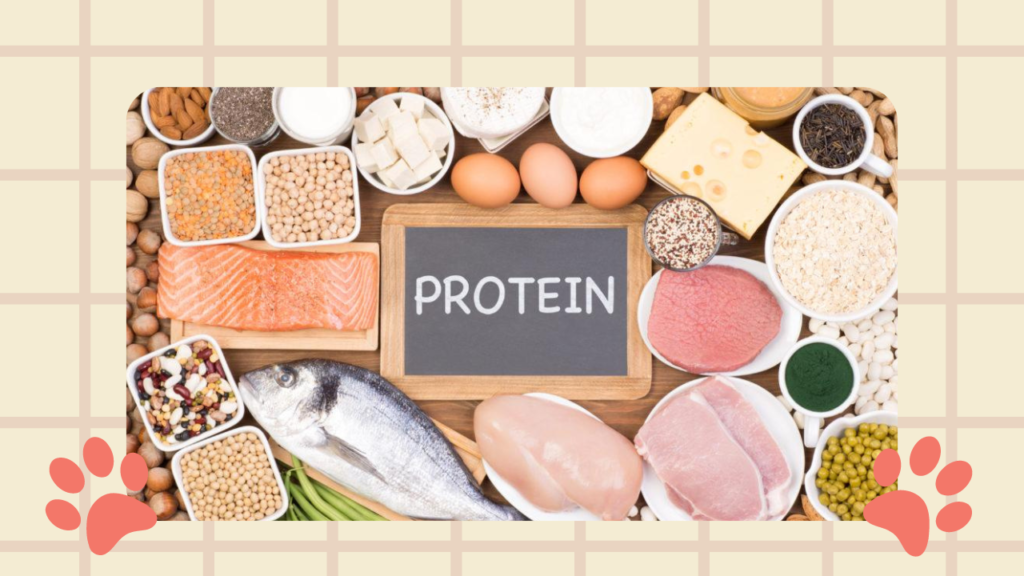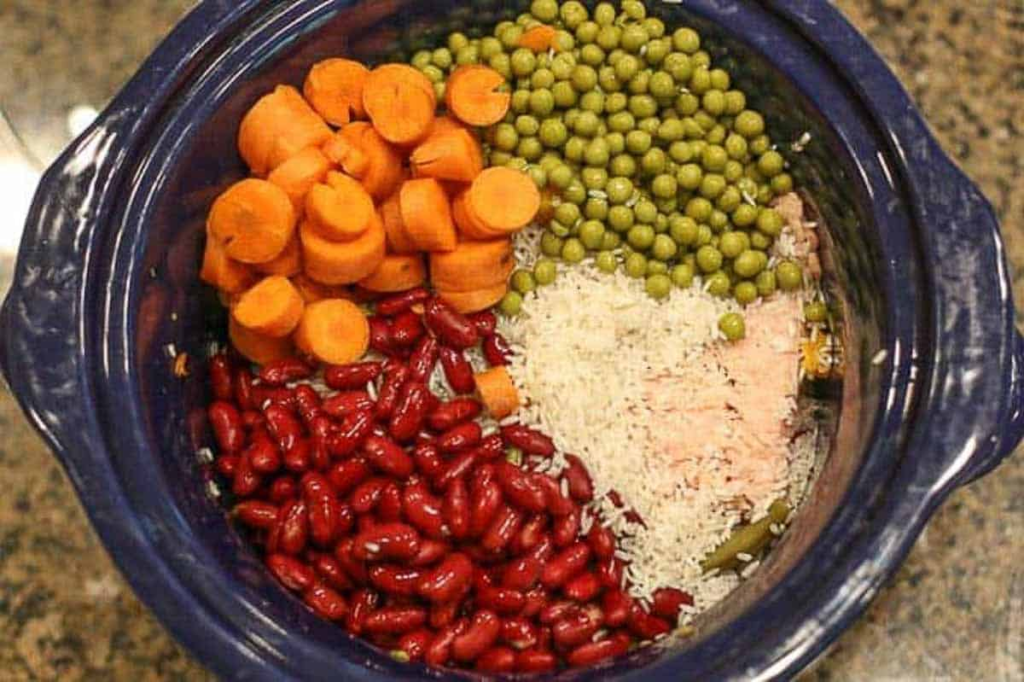
High Protein Dog Food is formulated to provide dogs with higher levels of protein compared to standard dog food. Protein is an essential nutrient for dogs, as it supports their muscle development, immune function, skin and coat health, and overall energy levels. Dogs, particularly active, working, and growing dogs, require more protein to meet their physiological needs. High-protein dog food is also beneficial for dogs recovering from illness, injury, or surgery and for those trying to build or maintain muscle mass.
Why Protein is Important for Dogs
Protein is made up of amino acids, which are the building blocks of tissues and organs. Dogs’ bodies need a variety of amino acids to perform critical functions, such as cell regeneration, muscle repair, hormone production, and immune system support. While dogs can produce some amino acids on their own, others—called essential amino acids—must be obtained through their diet. High-protein dog food ensures that dogs receive adequate levels of these essential amino acids.
The benefits of high protein in a dog’s diet include:
- Muscle Maintenance and Growth: Protein is essential for building and repairing muscle tissue. Active dogs, working dogs, and those participating in high-intensity activities need more protein to maintain their muscle mass and energy levels.
- Improved Energy: Dogs that engage in strenuous activities benefit from the additional energy that high-protein dog food provides. Protein is a critical energy source, especially when fats and carbohydrates are not sufficient.
- Weight Management: High-protein diets can be helpful in weight management, as they can help dogs feel fuller for longer, reducing the likelihood of overeating.
- Improved Coat and Skin Health: Protein is vital for the production of healthy skin cells and a shiny, strong coat. Dogs with poor protein intake often have dull coats and dry, flaky skin.
Ideal Candidates for High Protein Dog Food
High-protein dog food is ideal for certain groups of dogs, including:
- Active Dogs: Dogs that regularly engage in physical activities like running, hiking, agility, or working (e.g., police dogs, service dogs) need higher protein levels to fuel their activity.
- Puppies: Growing puppies need high levels of protein to support their rapid growth, development of muscles and organs, and energy needs.
- Pregnant or Nursing Dogs: Pregnant or lactating dogs require more protein to support their own health and the development of their puppies.
- Senior Dogs: Senior dogs may benefit from high-protein diets to help maintain muscle mass, which naturally declines with age.
- Dogs Recovering from Illness or Injury: Protein helps repair and regenerate tissues, making it crucial for dogs recovering from injuries, surgeries, or illness.
- Dogs on Weight Loss Programs: High-protein foods can be beneficial for overweight dogs, as protein helps maintain lean muscle mass while promoting fat loss.
Key Features of High Protein Dog Food
- High-Quality Protein Sources: The quality of the protein matters. High-protein dog food typically uses real meat or fish as the primary protein source, such as chicken, beef, lamb, turkey, or salmon. Some formulas also use novel proteins like bison, venison, or duck, which are beneficial for dogs with food sensitivities or allergies.
- Limited Carbohydrates: Many high-protein dog foods have a lower carbohydrate content. They focus on providing energy through fats and protein rather than carbohydrates, which can help reduce blood sugar spikes and promote a more sustained release of energy.
- Balanced Nutrition: While the protein content is high, these foods are still balanced with necessary fats, vitamins, and minerals to ensure the dog’s overall health. Omega-3 and omega-6 fatty acids, in particular, are important for skin, coat, and joint health.
- Grain-Free Options: Many high-protein dog foods are grain-free, using alternative carbohydrate sources like sweet potatoes, peas, or lentils to provide fiber and energy without the use of grains like corn or wheat.
Brands That Offer High Protein Dog Food
Several reputable brands offer high-protein dog food, catering to the needs of various breeds, life stages, and activity levels. Some of the popular brands include:
- Blue Buffalo Wilderness: This brand offers a range of high-protein, grain-free formulas made with real meat like chicken, salmon, or duck. Their Wilderness line is designed for active dogs and those needing extra protein.
- Taste of the Wild: Known for its novel protein sources, Taste of the Wild offers high-protein formulas using ingredients like bison, venison, wild boar, and trout. Their recipes are grain-free and include fruits and vegetables for added antioxidants and fiber.
- Orijen: Orijen dog food is known for its biologically appropriate recipes that mimic the natural diet of dogs. Their high-protein formulas include up to 85% animal ingredients, including fresh or raw meats like chicken, turkey, and fish. Orijen foods are grain-free and made with regional ingredients.
- Merrick Grain-Free: Merrick’s high-protein dog food uses deboned meat as the first ingredient in all of their recipes. Their grain-free options offer a variety of protein sources like beef, chicken, and lamb, along with sweet potatoes and peas for carbohydrates.
- Wellness CORE: Wellness CORE is a high-protein, grain-free line from Wellness that focuses on meat-based diets. Their recipes feature deboned turkey, chicken, or fish as the main protein source and are designed for dogs with high activity levels.
- Victor Hi-Pro Plus: This brand is designed for active dogs and working breeds. Victor Hi-Pro Plus features a high protein content, with 88% of the protein coming from meat sources like beef, chicken, pork, and fish.
Homemade High Protein Dog Food

For pet owners who prefer to make their dog’s food at home, it is possible to create high-protein meals using natural ingredients. Homemade dog food allows you to control the quality and quantity of ingredients, ensuring that your dog is getting the best nutrition possible. However, it’s important to consult with a veterinarian or a canine nutritionist to ensure the meals are balanced and meet your dog’s specific needs.
Here are some common ingredients used in homemade high-protein dog food:
- Lean Meats: Chicken, turkey, beef, lamb, or pork are excellent sources of protein. Be sure to remove excess fat and avoid seasoning the meat, as some spices and additives can be harmful to dogs.
- Fish: Salmon, mackerel, or sardines are rich in protein and omega-3 fatty acids, which help support healthy skin and coat.
- Eggs: Eggs are a complete protein source, providing all the essential amino acids that dogs need. They can be scrambled, boiled, or baked.
- Organ Meats: Liver, kidneys, and hearts are rich in protein and essential vitamins and minerals. However, they should be fed in moderation, as they are very nutrient-dense.
- Cottage Cheese or Plain Greek Yogurt: These dairy products are high in protein and can be a great addition to a homemade dog food recipe. Be sure to use unsweetened, unflavored varieties, as sugar and artificial sweeteners can be harmful to dogs.
- Quinoa: Although a carbohydrate, quinoa is a complete protein source and can be a good addition to homemade dog food. It’s also gluten-free and easy to digest.
- Chickpeas or Lentils: These legumes are plant-based sources of protein and fiber. They can be cooked and added to your dog’s food for an extra protein boost.
Sample Homemade High-Protein Dog Food Recipe
Ingredients:
- 2 lbs. lean ground turkey or chicken
- 1 cup quinoa or brown rice
- 1 cup chopped spinach
- 1 cup diced carrots
- 1 cup peas
- 2 tbsp. fish oil or flaxseed oil (for omega-3 fatty acids)
Instructions:
- Cook the quinoa or brown rice according to package instructions.
- In a large skillet, cook the ground turkey or chicken until fully cooked through. Drain any excess fat.
- Steam the vegetables (spinach, carrots, peas) until tender.
- In a large bowl, combine the cooked meat, quinoa/rice, and vegetables.
- Drizzle with fish oil or flaxseed oil and mix thoroughly.
- Allow the food to cool before serving, and store leftovers in the refrigerator for up to 4 days.
Always consult your veterinarian when making significant dietary changes, particularly if considering homemade food, to ensure your dog’s nutritional needs are fully met.




